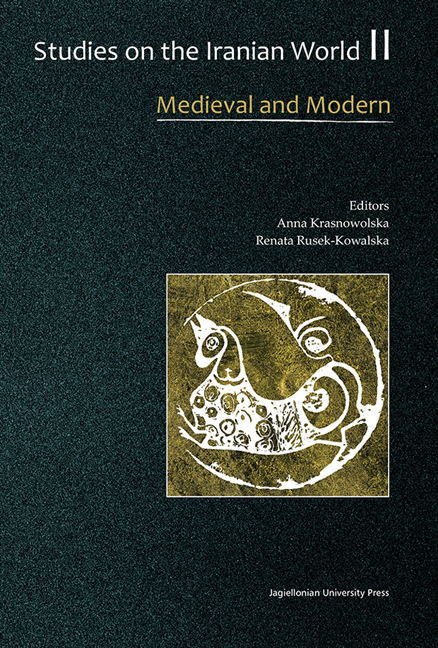Book contents
- Frontmatter
- Contents
- Foreword
- Linguistics
- The Northern-Central Group of the Iranian Central Dialects: an Areal and Diachronic Perspective
- Some Comments on a Parallel Text in Dari, Tojiki and Farsi
- Verbalization of the Universal Human Concept of the Soul in Persian
- The Problem of Subject Clauses versus Complement Clauses in Persian
- Literature
- Religion
- History
- Arts
- Social and Cultural Studies
Some Comments on a Parallel Text in Dari, Tojiki and Farsi
from Linguistics
Published online by Cambridge University Press: 12 January 2018
- Frontmatter
- Contents
- Foreword
- Linguistics
- The Northern-Central Group of the Iranian Central Dialects: an Areal and Diachronic Perspective
- Some Comments on a Parallel Text in Dari, Tojiki and Farsi
- Verbalization of the Universal Human Concept of the Soul in Persian
- The Problem of Subject Clauses versus Complement Clauses in Persian
- Literature
- Religion
- History
- Arts
- Social and Cultural Studies
Summary
SUMMARY
An analysis of multilingual texts is an important tool in linguistic research. It is particularly valuable in the case of dead and forgotten languages, however, this is certainly not the only situation, in which this method is of use. In the present article, translations of the Universal Declaration of Human Rights into Dari, Farsi and Tojiki are analyzed. Historically, the three idioms are derived from one source, however, their present status is worth discussing, especially when considering the relationship between Tojiki and Farsi. The analysis presented in the article is focused primarily on differences in the lexica, phraseology, morphology and syntax.
DARI, FARSI AND TOJIKI
Dari, Farsi and Tojiki are three closely related idioms that belong to a vast continuum of varieties of Persian. Farsi (henceforth FA) and Tojiki (TJ) form the opposite extremities of this continuum, while the dialects of Afghanistan (i.e. Dari (DA) in particular) have an intermediary position.
Historically, the three idioms are derived from one source, however, their present status is worth discussing, especially when considering the relationship between Tojiki and Farsi. As Perry notes, the emergence of spoken TJ as a separate ethnolect started around the 16th century, although the common literary standard was preserved well into the modern times.
Whether or not the twentieth century concluded the process of the emancipation of TJ as an independent language is a question that cannot be solved in this short article. We may only note that the problem is not restricted to the field of linguistics as is the case with all the language vs. dialects controversies. This is why we will use terms like ‘idiom’ or ‘ethnolect’ instead of ‘language’ or ‘dialect.’
THE ANALYSED TEXTS
An analysis of multilingual texts is an important tool used when studying languages, particularly those that are forgotten. However, reading texts in dead and forgotten languages is not the only situation, in which an analysis of multilingual texts may be of use. We shall hopefully see that it can reveal interesting facts in relation to idioms which are still spoken and are well known.
The texts we will analyse are three translations of the Universal Declaration of Human Rights (UDHR).
- Type
- Chapter
- Information
- Studies on the Iranian WorldMedieval and Modern, pp. 23 - 34Publisher: Jagiellonian University PressPrint publication year: 2015



